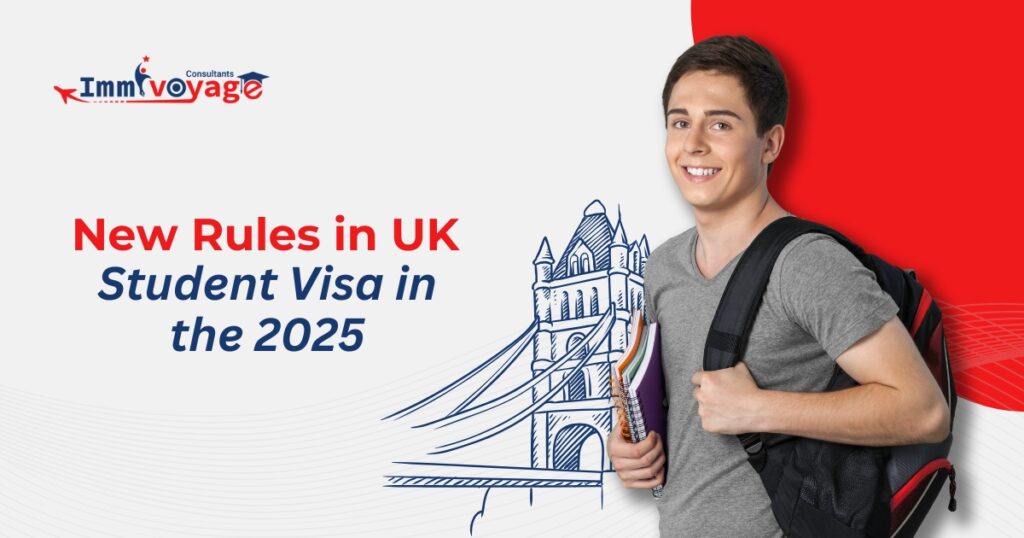In 2025, the UK has significantly changed its immigration rules to tame excessive immigration. The goal is to bring the far too-high migration down.
These changes will affect how long you can stay in the country, whether you can bring your family there, your work opportunities after graduation, and even how universities handle your visa.
So, if you’re a student wanting to go to England, you should know about these new rules in the UK student visa changes. In this blog, we’ll break down all the latest rules and updates in simple language so you can understand how these new rules might affect your plans. Let’s go.
Why Did the UK Change Its Student Visa Rules?
Over the years, migration levels, including students and workers, have grown significantly. To control this, the UK government introduced these changes through the “Restoring Control over the Immigration System” white paper document, published in May 2025.
With this document, the government aims to manage migration numbers more strictly. The document focuses on the need to balance the benefits of international students with the imperative to manage migration effectively. The government introduces the following new rules for international students in the UK:
- This makes it harder for students to bring dependents unless they meet strict requirements.
- This ensure that international students have the ability to financially support themselves.
- Adjust work opportunities for graduates to balance the UK labor market.
- Improve control over visa compliance and unauthorized work.
What are the New Changes in the UK Student Visa 2025?
The present reform attempts to balance several elements in the immigration system, such as family and work visas, status for dependents, occupation lists, graduate visas, and English language requirements.
Let us now explore these recent changes in depth to shed light on their possible effects on international students who intend to study in the UK:
Increased Financial Requirements
From 11 November 2025, international students will need to show higher financial capacity to support themselves in the UK. This requirement ensures students can genuinely support themselves without relying on public funds or excessive work hours.
Now, students in London need £1483 per month, and those living outside London need £1,136 per month, for up to nine months, in addition to tuition fees.
The money must be in the bank for at least 28 consecutive days, and proof can include bank statements, scholarship letters, or official sponsorship letters. Students are advised to start saving early, keep a steady balance, and have slightly more than the minimum to show financial stability.
This applies to all new student visa applications and may also affect visa extensions for current students. For more detailed information, you can visit the UK government’s official website.
Restrictions on Dependents
Implemented in January 2024, according to this change, most international students will not be allowed to bring dependents to the UK. Hence, they cannot bring their partners or their children under 18 through a student visa.
This may include students who have to take care of their relatives or are planning to bring their family members during their studies. These regulations don’t affect:
- Students on government-sponsored scholarship programs (such as Chevening or Commonwealth Scholarships)
- Students enrolled in postgraduate research programs (PhD or research-based master’s programs lasting over 9 months)
- Students in research-based higher degree programs lasting more than 6 months
This restriction significantly affects students with families. If you plan to bring dependents, ensure your program qualifies for the exemption before applying.
Stricter English Language Requirement
Starting from 2026, students switching from a student visa to work routes will need B2 level English (Independent User Level) instead of the current B1 requirement. This represents an A-level equivalent standard of English.
And for adult dependents, students must demonstrate an A1 level of English when applying. For visa extensions, dependents must progress to the A2 level, and for settlement applications, dependents need the B2 level of English proficiency.
These requirements aim to improve integration into UK communities and enhance employment prospects. The changes affect approximately 6,000 visa applicants annually across work and study routes.
Reduction in the Graduate Visa Duration
Previously, international students could stay for 2 years (3 years for PhD graduates after completing their studies through the Graduate visa route.
But now, according to the new rule that is going to be enforced in January 2026, the Graduate visa duration has been reduced to 18 months for undergraduate and postgraduate students, while PhD graduates retain the 3-year period.
This change aims to ensure that graduates transition more quickly into graduate-level employment. Students completing their courses from January 2026 onwards will be subject to this new timeframe. The government expects this to reduce annual student inflows by approximately 12,000 per year.
These modifications show the UK government’s aim of keeping the net migration level in check. International students should be on the lookout for these changes and stay well-informed of how they might affect their study and post-study plans in the UK.
Frequently Asked Questions About Rules for Student Visa in the UK
Let’s look at a few questions people often ask about the new rules in UK student visas. International students need to know the new rules, which will help them decide about their studies and career prospects in the UK. Let us now go through some of the frequently asked questions.
1. What Will Be the Effect of the New Rules on Old Students?
The new regulations primarily limit the number of international students who can bring their family members to the UK. Moreover, students must complete the course application before changing to a work visa.
The exception is only for full-time students whose PhD or doctorate programs last over nine months. Or their research-based higher degree programs last more than six months, or in case students are sponsored by the government who study for more than six months.
2. What is The Possible Way to Bring a Spouse or Relative?
To sponsor a spouse or your partner, the sponsor must meet a minimum income requirement of £29,000 instead of £18,600, as it used to be. This applies if the students are in the UK with a valid visa or working on an eligible visa.
3. Will there Be Any Fines for Illegal Working?
Yes, the employer who hires someone without the legal right to work can be fined up to £60,000 for every employee. If they knowingly employ illegal workers, they can face up to five years in prison and unlimited fines.
4. What is the Salary Requirement for New Workers?
The baseline minimum salary to be sponsored for a Skilled Worker visa has increased from £38,700 to £41,700. Additionally, under certain conditions, such as being under 26, a recent graduate, or in professional training, the salary can be as low as 70% of the going rate, provided it meets a minimum threshold.
Conclusion
The UK remains one of the top destinations for Indian students looking to pursue higher education. If you are considering continuing your studies in the UK, thoroughly review the recent rules for student visas in the UK and see how they can affect you. You don’t want to be stuck in England during your education, worrying about your visa applicability and other related concerns.



